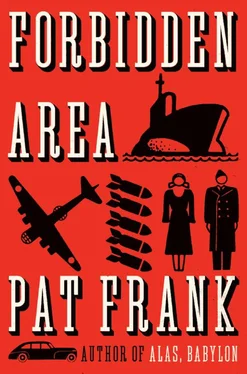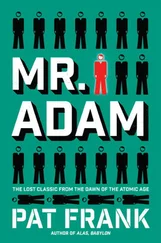Price said, “I’ll be right down.” This was what he had been waiting for—Keatton’s evaluation of the B-99 business. He finished tying his laces and started on the long hike north, leg muscles protesting and toes burning. He was no infantryman. 7
The relationship of General Keatton to Jesse Price was that of a father to a son—except that Price was only one of a hundred sons, each receiving, consequently, a tiny fraction of personal attention. Yet it was enough. It was a bond that held the devotees of the Air Force together, close as an Indian tribe that initiates its youth in pain and blood. The careful selection of protégés dated to the days of Billy Mitchell and Hap Arnold, when the Air Force was fighting for its separate existence, and perhaps its life, against enemies domestic rather than foreign. When Hap Arnold found a young man dedicated to flight, his eyes on the stars and his feet on the ground, he made him his son, and the tradition had continued.
Jesse Price was chosen for this brotherhood after Keatton came to Italy in the summer of 1944 as a deputy commander of Fifteenth Air Force. Price, then a lieutenant in his early twenties, flying a lumbering B-24, had qualified himself by a single act, and the correct answer to a single question. When his squadron leader was shot out of the sky by an 88, Price had led the formation on to bomb the primary target, a refinery near Wiener Neustadt. Because of foul weather, the Fifteenth had radioed in flight permission to all groups to seek easier, secondary targets, and everyone else had. While he was pinning a star on Price, the general asked: “What made you go for the primary, son?”
The gawky lieutenant (you could tell he was still growing because his wrists extended two inches beyond the sleeves of his best jacket) had been embarrassed as an adolescent called upon for public recital of poetry. Finally he said, “Sir, I kept thinking that if we didn’t do it that day, we’d have to go back again.” He hesitated and went on. “And I don’t want to die for nothing. I don’t want to die for Rosenheim or Klagenfurt. If I get it, I want it to be for something big, like Wiener Neustadt.”
This answer had pleased Keatton, who had marked Price for the future. Just so other generals in other lands marked young officers for exceptional deeds, such as twice, with coolness and guile, blowing up German pillboxes on the eastern approaches to Berlin.
Jesse Price’s career would have ended after his misfortune over Korea except that Keatton had noted his name on the casualty lists. Instead of being invalided out of the Air Force after his release from the hospital in Japan, Price received orders to Washington. This particular major, Keatton had decided, even though deprived of an eye, still had spirit and a logical mind. The thing to do was train that mind. Send him to the National War College, send him to Russia, send him back to sop up more lore of the Far East. Assign him to the Intentions Group—Keatton called it “the unholy seven,” defended its functions, and was amused rather than angered when it blundered—and let him exercise his imagination. The Air Force would use this boy for the war of wits, the war of the future.
When Price walked into Keatton’s inner office he saw that he was junior in rank to all there. The chairs drawn up to the general’s desk were occupied by other generals of three or two stars. Brigadiers stood. Inconspicuous against the wall were two lieutenant-colonels, no older than himself. He would have been a light colonel, also, except for his wound. Promotion came quickly to men commanding squadrons, slowly to men in hospital or flying a desk, out of sight and out of mind abroad. He found a slice of wall against which to lean beside Polk and Rankin, the light colonels.
The general was listening to the other generals. The general sat back in his chair, relaxed, with the flags of his country and his rank staffed behind him, his delicate, wrinkled hands patting the spot where his jacket stretched. The general was slight, and probably not more than five pounds overweight, but the excess was all in one place. His hair was white and sparse, his brows white and heavy, his eyes deep blue like the blue in the flags, his mouth straight, his teeth his own and fine.
The talk, at this point, was technical. It concerned tons of fuel, wing stress factors, thickness of aluminum skin, pounds of pressure per square inch, and the inability of the human body to withstand a blowout at high altitudes, where the blood itself boils.
General Keatton spoke. “Is there any chance these two aircraft could have come together?”
A major-general, the A-3, Operations, held up a yellow sheet of teletype paper. “No, sir. I don’t think it’s possible. Here’s the tower log, sent in from Hibiscus. These two planes were to fly to Corpus Christi for a rendezvous with tankers, then swing north for a target run on Omaha at fifty thousand, then return to base. A milk run. Takeoff time for the first was oh-eight-twenty-seven. Takeoff of the second was four minutes later. They maintained the same speed and rate of climb, and, we can assume, about the same interval. At five hundred knots, they were about twenty miles apart. Weather, CAVU. They weren’t close enough together to see each other, but if they had got close enough, they certainly would have.”
“So mid-air collision is ruled out,” said Keatton. “Kidnapping is out too. I’ll admit that I considered the possibility that the enemy could have snatched that first one last month. But he can’t kidnap three B-Nine-Nines. Not from one base he can’t. Not with half my SI teams at Hibiscus. Not with Lundstrom there, eating out the Air Police. I’ll bet a red ant couldn’t have crawled out on the Hibiscus flight line this morning.” The general leaned forward, lifted his locked hands and brought them down on the bare, polished desktop, gently. “Know where that leaves us, gentlemen?”
They all allowed him to say.
“Structural failure or treason!”
He waited for them to absorb the word.
“I use the word treason rather than sabotage because if it was sabotage it had to be done by people in uniform, which makes it treason. It had to be treason within the Air Force.”
Jesse Price drew in his breath and held it. Neither he, nor anyone else in the room, stirred. They waited for Keatton’s next words.
“I hardly know which is worse, basic structural failure or treason. I hope it is only treason.”
Jesse thought he was hearing wrong, or that Keatton had got his phrases twisted, but the general continued:
“If it is treason it is probably localized to one base, and certainly we cannot lose too many planes. If it is structural failure it means every B-Nine-Nine on every base we own.”
Now Price understood the general’s reasoning, and the fear that had been in the back of his mind since the morning’s conference, when his secretary first phoned him the news, began to take form, as a shapeless dark cloud whirls itself into the deadly funnel of a tornado. If it was structural failure, Keatton would have to ground the B-99, which meant grounding all heavy bombers of SAC. There could be no other choice. Keatton would be called upon to obliterate, by a single order, the weapon of massive retaliation, the weapon that had maintained the peace of the world. If there was a weakness in the 99, Keatton could not send up his men in it until the weakness was ferreted out and corrected. The people wouldn’t stand for it.
The general spoke again. “I keep thinking of the British Comets—you remember—the first jet airliners. Two of them blew, one after the other, over the Med. Early in ’fifty-four, if I remember correctly. It was structure failure—metal fatigue. Take a piece of tin and bend it in your fingers, back and forth, back and forth.” The general’s frail fingers bent an imaginary piece of metal. “Finally, it snaps. It took the British months to find out where, and why. Meanwhile, all Comets were grounded.”
Читать дальше












